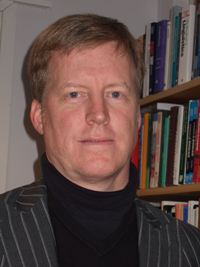Will guide women to the top
Hierarchies and lack of management prevent women from climbing to the top in academia, says Curt Rice, the new Pro-Rector at the University of Tromsø. He calls for more management and different work methods at the university.

In order to increase the number of women in leading academic positions we need a conscious approach to how research is organised and get rid of the deep-seated hierarchical structures within academia, says Curt Rice, Professor of Linguistics and the new Pro-Rector for research and development at the University of Tromsø.
The professor says that many female academics choose a career in the corporate world over academia even though this brings less prestige. The traditional explanation is that women are willing to accept this loss of prestige because it is easier to combine research and family life in private industry. Rice also believes that the work culture in the corporate world may be part of the reason.
The corporate world and academia
He refers to the work of the American sociologist Kjersten Whittington. She has compared men and women’s productivity by looking at the degree of patenting in industry and academia.
"Whittington found that patenting is much more common in industry, regardless of gender. At universities, however, more than twice as many men as women took out patents. Amongst the businesses she studied, gender was not a factor," says Rice.
He believes that these results show that women have better opportunities for patenting in the corporate world, and implicitly are more equal to their colleagues than what is the case at universities.
More anarchistic
"Whittington’s idea, which I find very interesting, was to look at the network structures of the different organisations. In research groups at the universities there is one strong individual in the middle and less direct communication between the surrounding 'satellite groups'. All communication goes through the centre, which maintains the general overview and knowledge. Thus, these networks become highly hierarchical," says Rice.

In research groups in the corporate world there is contact between everyone and the power is not as centralised.
"There is a classic correlation between the structure of the research group and how often women take out patents. According to Whittington’s study, women are less productive in research groups with deep-rooted hierarchical structures than in groups with more anarchistic structures. This is quite a find. My conclusion is that women may have very good reasons for choosing a career in private industry over academia," says Rice.
Breaks down structures
The last six years he has been head of CASTL, The Center for Advanced Study in Theoretical Linguistics. Their senior researchers each lead a research team consisting of people from different levels, from master students to fellow researchers. At the same time they participate on at least one other team.
According to Rice, this way of organising a research group is quite uncommon within the humanities.
"We believe that this helps break down traditional hierarchical structures. I think that less hierarchy makes it easier to talk to the senior researchers."
So far, men have held the majority of the senior research positions at CASTL. However, Rice reveals that Marit Westergaard will take over as the head of CASTL when he becomes Pro-Rector on January 1 2009.
Westergaard becomes a senior researcher in the group. This means that two of six senior researchers will be women, whereas they were all men when the center was established in 2002.
A conservative workplace
"To attract more women to the highest levels in academia we should not focus on gender differences but on the university as a workplace. In my opinion, the university is a very conservative organisation and it is incredibly difficult to get people to do things differently."
Rice mentions particularly the university staff’s scepticism towards the concept of management.
"When I was appointed institute director at the university many years ago my work revolved around teaching schedules and the planning of exams – in other words, purely administrative tasks that did not really involve management," he says.
According to Rice this is due to a misinterpretation of the term 'management'. He believes that management is a matter of giving employees guidance and feedback so that they know if they are doing a good job and have the opportunity for further development.
"The university has no tradition for this. But I need a colleague who comes to my lectures to evaluate me and who asks about my research project."

Amateurish leadership
Rice states that strong and good leadership can be an effective way to break down and change the hierarchical structures in academia. He points out that many academics end up in management without having any formal training.
"We have an amateurish management because we have a system – from the PhD level and up – with no management training. The rate of success is left to chance," he says.
In the autumn of 2009, the University of Tromsø gets six new deans and 30-40 new institute directors. Together with Rector Jarle Aarbakke and the new Pro-Rector for education, Britt-Vigdis Ekeli, Rice has decided that the new deans and institute directors will undergo a management training program.
"People are afraid of the word management because they think it means that someone will tell them what to do. This is an old-fashioned notion. A manager should be a resource and ally who share his or her experience with others. One should not fear management; it is lack of management one should be worried about," Curt Rice concludes.
Translated by Vigdis Isachsen
Curt Rice is a Professor of Linguistics and head of CASTL, The Center for Advanced Study in Theoretical Linguistics, at the University of Tromsø. On January 1 2009, he assumes the position as Pro-Rector for research and development at the merged university. On October 22, he participated at the Swiss-Norwegian conference Gender equality in higher education and research in Switzerland. Rice will also be present at (E)Quality 2009, a Nordic conference on gender equality in research, which takes place in Oslo on March 23-24 2009.
See
Kjersten Bunker Whittington is an Assistant Professor of Sociology at Reed College in the United States. She has published the paper: Whittington, Kjersten B. 2008. Patterns of Male and Female Scientific Dissemination in Public and Private Science.
